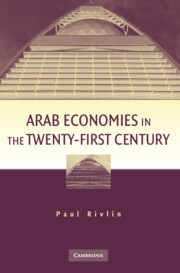13 - Conclusions: The Arab Equilibrium
Published online by Cambridge University Press: 05 June 2012
Summary
The Arab world is experiencing demographic transition: the population of working age is increasing faster than the dependent population. The growth of the labor force provides the opportunity to increase production and thus income but the condition for this to take place is faster employment growth. The rise in oil income over the last decade, plus the effect of limited economic reforms, has resulted in somewhat faster employment growth in recent years, but it has not been enough to reduce unemployment significantly. The very high levels of youth unemployment pose a serious threat to social and political stability and have persisted for years. Given the severe imbalances that exist in the labor markets of all Arab countries, the central question posed in this book is “Why have reforms been so limited?” This chapter examines the reasons why. The basic concepts outlined in Chapter 3 were chosen because of their relevance in explaining the weak economic development of the Arab world. There are overlaps between the works of those cited as well as contradictions. My interpretation uses these ideas eclectically.
The ideas examined in Chapter 3 suggest a number of conclusions. The first is that what happens today and what people plan for the future (or do not plan) is affected by past events and maybe by those in the distant past. This is largely because institutions, ideas, and knowledge are formed over time.
- Type
- Chapter
- Information
- Arab Economies in the Twenty-First Century , pp. 287 - 296Publisher: Cambridge University PressPrint publication year: 2009



